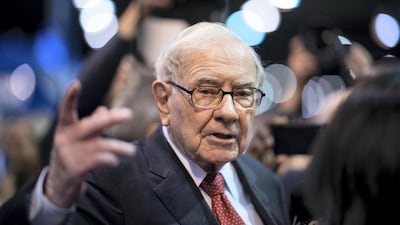Last week a well-researched article in this newspaper outlined the case for passive versus active funds for long-term investors interested in securing their financial independence.
However, this could be a case of missing the wood for the trees. Yes, there are merits to low-cost exchange-traded funds in accumulating money over a long period of time. Simply put, more is invested because less is spent on fees and this gradually adds up.
But the bigger question remains: should you really be in stock markets at all?
This particularly applies in the US where market capitalisation as a percentage of GDP is at an all-time high — that’s Warren Buffett’s favourite indicator of overvaluation. Anything over 100 per cent means overvaluation. Today this indicator stands at a gobsmacking 138 per cent.
Another sure sign of a market topping out is somebody in a huff pulling their money out of Mr Buffett’s holding company Berkshire Hathaway and complaining that the world’s greatest investor is not buying anything.
Step forward David Rolfe, a long-time shareholder and chief investment officer at the otherwise obscure Wedgewood Partners, who did just that last week. He could of course be a better judge than the Sage of Omaha.
Still is it wise to be standing on a beach as a tidal wave approaches, hoping for a last dip?
More seriously, selling out when an asset is very highly valued and then buying it back later — or something else entirely — at a great price is a classic formula for boosting your net worth.
Try to think of cash itself as an investment asset for a short period. It may only carry a very low interest rate, or zero, but its nominal value will not change in a storm, although you must also be wary about holding an overvalued currency for too long.
Professional investors tend to give a greater weighting of treasury bonds or precious metals as a cash equivalent in such circumstances. These are available conveniently for individual investors as ETF products such as TLT, GLD and SLV, for example.
Basically you are trying to park your money in a safe haven while the financial storm passes. Then you can emerge from hiding and pick up the bargains.
Everything in financial markets is cyclical, though not to the extent that timing is like clockwork. That said, the last major financial crisis started in October 2008 and another does seem way overdue by normal cyclical calculations.
At the very least it would seem prudent to increase the weighting of these safe haven assets in your portfolio. A client survey by UBS Asset Management reported that millionaires were hoarding a third of their wealth in cash this spring.
Perhaps they would have been better served by gold as this column suggested in May. Gold prices have been on a tear since the end of May, up $270 (Dh992) an ounce before consolidating around the $1,500 mark. Some analysts predict a further pullback — perhaps alongside a stock market correction — to $1,425-$1,460 before a much bigger rise.
It is not just that US stock markets are looking frothy compared to Europe and Asia; recession warning alarms are going off across the statistical spectrum, from factory orders to an inversion of the yield curve, quite apart from the Chinese trade war and Brexit morass. Any Wall Street correction will also collapse other global financial markets in its wake, such is the interdependence of the world economy these days.
Bond markets usually benefit immediately from an influx of cash in a big share sell-off. But this can be short-lived if the Federal Reserve slashes interest rates to boost liquidity in the financial system.
So for the smaller investor, cash is normally king in a recession. If you have it, then assets are immediately available for unmissable prices. Draw up a shopping list of shares you would like to own for what you would consider a good price while sitting out the crisis.
You could do exactly the same with ETFs as they will sink in value too, and offer no additional downside protection to shares. Your risk might be better spread than with individual stocks but you will still have all the losers in your portfolio.
Another tip would be to move into a different investment class altogether. Bear stock markets can last for many years; an asset class that was previously neglected could give much quicker and better results.
UAE investors who pivoted from global stocks in mid-2008 to buy gold shares, local bonds or property did spectacularly well within a couple of years, although you can’t rely too much on history repeating itself. Global stocks might also not bounce back as quickly this time around.
Peter Cooper has been writing about Gulf finance for two decades

